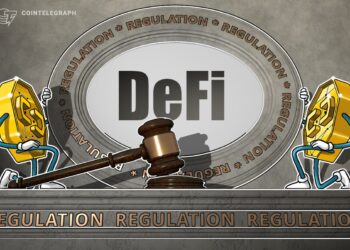Enterprise capital agency Paradigm has filed an amicus transient in help of Twister Money co-founder Roman Storm, arguing the jury must be correctly briefed on the legislation’s definition of what working a money-transmitting enterprise entails.
Jury wants the total context of the legislation
In its amicus transient, filed in a New York District courtroom on June 13, Paradigm argues that the courtroom should make sure the jury understands that for Storm to be found guilty, the prosecution should show he was knowingly working a money-transmitting enterprise.
This consists of charging charges, knowingly transmitting funds on behalf of the general public, knowingly dealing with the precise proceeds alleged to be felony, and having custody or management of the funds being transmitted or transferred.
An amicus transient is filed by a celebration in a roundabout way concerned in a courtroom case however has an curiosity within the consequence and hopes to supply the courtroom with recommendation or one other perspective.
Twister Money is a non-custodial crypto mixing protocol; the builders by no means maintain or management the funds. The New York US Lawyer’s Workplace argues that Storm conspired to run the crypto mixing service as an unlicensed cash transmitter.
Software program builders aren’t cash transmitters
Katie Biber, Paradigm’s chief authorized officer, and Gina Moon, the agency’s basic counsel, said in a weblog put up on Tuesday that the prosecution’s argument is “opposite to the plain textual content of the legislation, clear FinCEN steerage, and a long time of case legislation.”
Biber and Moon argue that beneath former President Obama, the US Treasury Division found in 2014 that software program improvement didn’t represent an acceptance and transmission of worth.
Additionally they argued that in 2019, the division found that complete unbiased management over customers’ crypto was a consider figuring out if an middleman is a cash transmitter.
“Permitting this cost to persist dangers letting unelected prosecutors change the plain that means of felony statutes–and threaten on a regular basis residents with imprisonment even when they’re following widely-disseminated and accepted regulatory steerage,” they mentioned.
The US charged Roman Storm and fellow co-founder Roman Semenov in August 2023, accusing them of serving to launder over $1 billion in crypto by way of Twister Money.
A responsible verdict may additionally damage innovation
Biber and Moon mentioned the “stakes of this matter are excessive” as a result of if Storm is discovered responsible, it may hobble the innovation and software program improvement in crypto and fintech.
On the identical time, they mentioned it may have ripple results on the broader open supply, AI and expertise communities as a result of software program builders could possibly be held liable for a way their merchandise are used.
Associated: Ethereum Foundation pledges $500K to Roman Storm’s defense
“That is as absurd as prosecuting a tv producer for the sharing of state secrets and techniques on-air, leather-based pockets craftsmen for wallets holding stolen money, or Apple for conspiracies shaped by way of iPhone conversations,” Biber and Moon mentioned.
The trial is anticipated to start on July 14. A conspiracy to function an unlicensed cash transmitting enterprise charge was dropped on May 15 after the Division of Justice launched an April memo that mentioned the company wouldn’t prosecute crypto mixers like Twister Money for customers’ actions.
Journal: China threatened by US stablecoins, G7 urged to tackle Lazarus Group: Asia Express



















